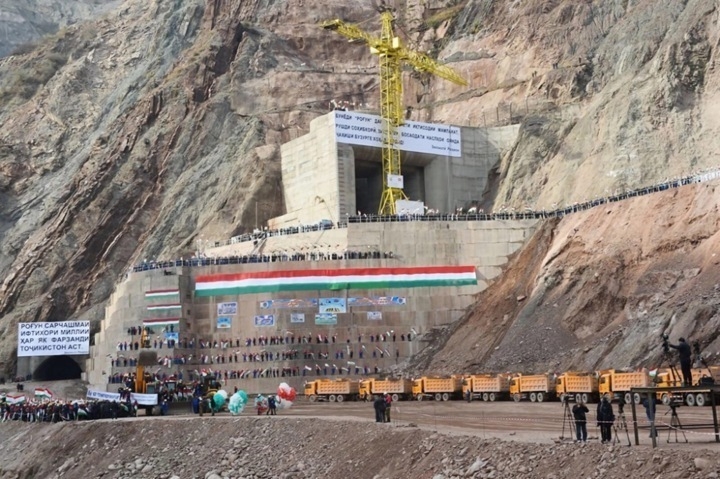On April 10, President of the Republic of Tajikistan Emomali Rahmon received Vice President of the World Bank (WB) Antonella Bassani and Managing Director for Operations Anna Bjerde. Prospects for cooperation were discussed. The day before, the World Bank Inspection Board registered a complaint about the financing of the Rogun hydroelectric power station in Tajikistan, which could cause damage to countries in the lower reaches of the Amu Darya. The cost of completing the project, which began during the Soviet era, is $6.29 billion. Now funds for hydroelectric power stations come, among other things, from the World Bank. Since the resumption of the project in 2008, its cost has reached $12 billion.

The complaint was initiated by activists of public organizations of Turkmenistan and Uzbekistan – countries located in the lower reaches of the Amu Darya River.
The notice of registration of the complaint states that the complainants chose to remain anonymous for fear of possible persecution. They explained to the Inspection Board that local organizations and activists in their countries could not represent them because of the risk of cross-border reprisals. It is noteworthy that about 60 thousand residents of Tajikistan, who will become internally displaced as a result of the construction of the Rogun reservoir, did not risk joining the complaint even anonymously. As a result, the interests of the applicants in communication with the Inspection Council are represented by the public foundation «Rivers Without Borders», based in Almaty (Kazakhstan). Information support for applicants is provided by several environmental organizations —Bank Information Center (USA), International Rivers (USA) and CEE Bankwatch (Czech Republic).
The complaint alleges that the Rogun hydroelectric power station project could cause serious socio-economic and environmental damage to countries downstream of the Vakhsh cascade of hydroelectric power stations in Tajikistan, including Turkmenistan and Uzbekistan. The applicants consider that the World Bank does not comply with its own socio-environmental standards (ESF) and has not properly developed the Environmental and Social Management Plan (ESMP) and the Environmental and Social Commitment Plan (ESCP) for the Rogun hydroelectric project. Errors and omissions of the World Bank in the design and implementation of the Rogun hydroelectric power station project, according to the applicants, can lead to environmental damage and negative consequences for the environment, health and social sphere of the local population living downstream of the dam.
Activists also point to the lack of meaningful public consultation and stakeholder engagement in Turkmenistan and Uzbekistan. They argue that plans to fill the Rogun hydroelectric power station reservoir (within 16 years) will lead to an annual reduction in flow into the Amu Darya delta by at least 25%, which will cause «a progressive disaster» in the ecologically degraded region. The construction and operation of a giant reservoir that can redistribute a significant portion of water resources could lead to the extinction of endangered fish species (such as the unique Amu Darya false shovelnoses) and the loss of tugai forests, including in the reserve «Tiger Beam», recognized in 2023 as a unique UNESCO World Natural Heritage Site.
Of particular concern are the socio-economic impact on the 8–10 million people living in the lower reaches of the Amu Darya. Changes in flow and deterioration in water quality will exacerbate problems of soil salinity, desertification, and decreased agricultural productivity, which will lead to poor public health, increased unemployment, poverty and forced migration. The applicants claim that these problems are not addressed at all in the socio-environmental assessment of the Rogun hydroelectric power station project presented on the World Bank website.
The complaint also notes that the project’s environmental documents were not available in Uzbek, Karakalpak and Turkmen, and there is also a lack of information about emergency plans and mechanisms for compensation for damage in the event of accidents.
«Registration of a complaint by the Inspection Board – this is an important first step that gives hope that the voices of local communities from Uzbekistan and Turkmenistan, who fear for their future and the environment, will be heard at the international level, – Alexander Kolotov, director of the Kazakh public foundation «Rivers Without Borders», told «Nezavisimaya Gazeta». – We represent the interests of these people which, due to the threat of cross-border persecution, cannot openly state their problems, and we will seek a thorough investigation of all the facts and concerns set out in the statement».
It is important to note that the environmental coalition «Rivers Without Borders» already has successful experience of interaction with the World Bank Inspection Board. Previously, representatives of the coalition and representatives of local communities filed a complaint about the World Bank’s financing of the MINIS project in Mongolia, which involved the construction of a hydroelectric power station on the tributaries of the Selenga River, which posed a threat to the ecosystem of Lake Baikal. Following a thorough investigation by the Inspection Board into this complaint, the MINIS project received no further funding and the Mongolian hydroelectric power stations that threatened Lake Baikal were never built.
Regarding the current statement of environmentalists, the Inspection Board of the World Bank, after conducting an initial inspection, considered the complaint regarding the Rogun hydroelectric power station to meet the admissibility criteria and registered it on April 8, 2025. World Bank management must now provide a response to the issues raised in the complaint by May 7, 2025. After receiving a response, the Inspection Board will make a recommendation to the Board of Executive Directors of the bank regarding the need for a full-scale investigation.
It is worth recalling that in 2010, the Inspection Council already received a complaint related to research on the Rogun hydroelectric power station, but then did not recommend an investigation, since the World Bank pledged to finance additional activities to take into account the concerns of residents of the lower countries of the Amu Darya basin. However, then the Inspection Council especially noted the possibility of filing a new complaint if the World Bank decides to finance the construction of the Rogun hydroelectric power station in the future.
Victoria Panfilova («Nezavisimaya Gazeta»)




